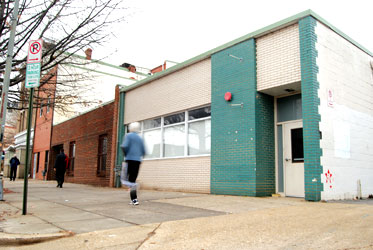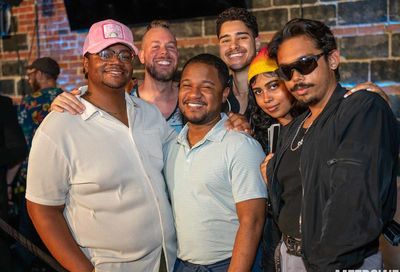Center Meets the Street
Community center and other LGBT groups working through funding pains
The Center, the area’s LGBT community center, is about to trade its third-floor perch above 14th and L Streets NW for a new home at street level.
David Mariner, executive director of The Center, announced Monday, Dec. 14, that the organization will soon move into two adjacent buildings previously owned by Whitman-Walk Clinic and sold to JBG Properties in 2008. Under WWC, one building housed the Austin Center, an HIV day-treatment center, and the other the Lesbian Services Program.

The Center’s new location
(Photo by Todd Franson)
”I think that having a location that’s visible, that’s street accessible and larger, is going to really open up the possibilities for The Center, and the perception of The Center,” Mariner says.
The Center has been operating out of third-story office space at 1111 14th St. NW since 2005.
”Our location is okay right now, but this new location is 10 times better. People can walk in from off the street, and people can be walking down the street and see that there’s an LGBT presence in the community.”
The buildings set to house The Center beginning Jan. 1 sit at the intersection of 14th and S Streets NW.
The combined space of the buildings — approximately 6,000 square feet — is twice the size of The Center’s current space. The Center sublets some of that current space to the local chapter of Parents, Families and Friends of Gays and Lesbians (Metro D.C. PFLAG) and Brother Help Thyself (BHT). According to Mariner, Metro D.C. PFLAG will move into Whitman-Walker Clinic’s Elizabeth Taylor Center at 1701 14th St. NW, and BHT will move to the Dignity Washington Center, at 721 8th St. SE, home to the LGBT Catholic group, Dignity USA.
While Mariner declined to provide the financial details of the move, he says the overhead costs associated with the new location are “significantly less” than what the organization currently pays.
“But I don’t think that’s the only reason we’re moving,” Mariner adds. “It’s also just a much better location.”
With the added space, The Center is currently negotiating with other LGBT groups looking to share the new home. Mariner declined to name those groups until negations are completed.
Though the move will give The Center a long-sought street-level presence, it will be temporary. JBG Properties will still be developing the properties at some point, leaving The Center to continue the hunt for a permanent home.
”It could be six months and it could be six years,” Mariner says of how long The Center may be able to occupy its new home before redevelopment. “We don’t know exactly how long it’s going to be, but it’s such a great location we thought why don’t we see if we can work something out?”
WWC Executive Director Don Blanchon, said in an attendant press release that he is pleased with the move.
”With The Center moving in at 14th and S Streets and Metro D.C. PFLAG moving into the Clinic in January 2010, the LGBT community will have a wide array of services conveniently located within two blocks.”
Still, 2009 was a difficult year for The Center, which currently operates with the help of more than 100 volunteers, and Mariner as its only full-time staff member.
Along with other LGBT organizations, The Center lost significant funding from the D.C. government as a result of cuts in the city’s 2010 budget.
Those cuts included $150,000 that The Center had received in years past to produce programs for the Crystal Meth Working Group, and $500,000 that The Center was expecting to find a new home.
Since the cuts last summer, The Center has not been able to allocate the money necessary to provide programming for The Center’s Crystal Meth Working Group, a unique program targeting meth addiction. Mariner said The Center had applied to a program that would’ve providing funding in August with the Department of Health’s Addiction Prevention and Recovery Administration that would have given The Center the money it needed to restart the CMWG on Oct. 1 of this year.
But The Center did not hear back from APRA until Nov. 16. The news wasn’t good.
In the rejection letter, Valerie E. Robinson, director of the DC Choosing Options for Recovery and Empowerment Program (DC CORE ATR), told The Center it was ineligible for the grant because it lacked a technical certification as a substance-abuse service provider.
Mariner counters that the grant application was misleading in that it included areas for applicants to identify themselves as community- or faith-based, or as a substance-abuse service provider. He was hopeful that The Center would have received the grant as a community-based group.
”What’s frustrating is that they have hundreds of thousands of dollars of unspent money within this particular program,” Mariner says.
Leslie Calman, executive director of the Mautner Project, hopes for better luck in seeking funds for the lesbian health organization that lost $200,000 for 2010.
”We are hoping still that we may get some of that funding by applying for … grants that are just now starting to come from city agencies, particularly the Department of Health,” Calman says. ”But at best it mea ns that getting the money is delayed by quite a long time.”
The most immediate impact those cuts have had on the Mautner Project is leaving the organization with a vacant position.
”We are down one staff member. That has a real impact for us because we had seven people, now we have six. That’s substantial in terms of the strain on the staff,” Calman says, though she declined to identify the empty spot. She did say, however, that Mautner is also relying on support from about 60 volunteers.
Transgender Health Empowerment is suffering similarly, after losing $150,000 in city funding. THE Director of Programs Brian Watson says, in part, the organization has been hanging on with support from the local community.
The Gertrude Stein Democratic Club donated $559, collected from donations at the gay political club’s Dec. 14 holiday party, to THE. Watson says THE is also the beneficiary of the Capital Queer Prom, slated for March 2010.
Regardless, he adds, ”Because of the budget cuts, we’ll have to cut more programming as we go.”
“We’ve already had to lay off staff,” which included one full-time person and three others who were working full-time and have now been cut back to part-time hours.
”If we lose anymore … funding we’ll have to cut three to four people,” Watson says, adding that THE is always accepting donations via the organization’s website.
For more information about Transgender Health Empowerment, call 202-636-1646 or visit www.theincdc.org. For The Center, call 202-682-2245 or visit www.thedccenter.org. For the Mautner Project, call 202-332-5536 or visit www.mautnerproject.org.
Support Metro Weekly’s Journalism
These are challenging times for news organizations. And yet it’s crucial we stay active and provide vital resources and information to both our local readers and the world. So won’t you please take a moment and consider supporting Metro Weekly with a membership? For as little as $5 a month, you can help ensure Metro Weekly magazine and MetroWeekly.com remain free, viable resources as we provide the best, most diverse, culturally-resonant LGBTQ coverage in both the D.C. region and around the world. Memberships come with exclusive perks and discounts, your own personal digital delivery of each week’s magazine (and an archive), access to our Member's Lounge when it launches this fall, and exclusive members-only items like Metro Weekly Membership Mugs and Tote Bags! Check out all our membership levels here and please join us today!






















